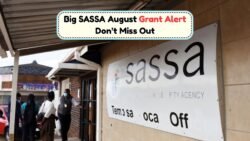R370 August SRD Grant Eligibility: The South African Social Relief of Distress (SRD) grant has been a lifeline for many citizens amidst economic challenges. This August, the R370 payout continues to provide essential support to eligible individuals. Understanding who qualifies for this grant is crucial, especially during these financially strenuous times. The grant aims to assist those most in need, ensuring that basic necessities can be met. As the country navigates economic recovery, the SRD grant remains a pivotal aspect of social welfare, providing a safety net for vulnerable populations.

Understanding the Eligibility Criteria for the R370 SRD Grant
To qualify for the R370 SRD grant in August, applicants must meet specific criteria, ensuring that assistance reaches those who need it most. Applicants must be South African citizens, permanent residents, or refugees registered on the Home Affairs database. Furthermore, they should be currently unemployed and not receiving any form of income or social grant, except for a child grant. It is crucial for applicants to be over the age of 18 and below 60 years, ensuring that those within the working-age bracket are prioritized. The application process itself is streamlined to be accessible, with an emphasis on transparency and fairness. Understanding and meeting these criteria is essential for potential beneficiaries, as it ensures that the aid reaches the intended recipients, thereby enhancing the overall impact of the grant system on South Africa’s socio-economic fabric.
How to Apply for the August SRD Grant Payout
Applying for the August SRD grant is a straightforward process designed to be as inclusive and accessible as possible. Applicants can submit their applications online through the official South African Social Security Agency (SASSA) website, which offers a user-friendly interface. Alternatively, applications can be made via WhatsApp or by using the USSD service, ensuring that those without internet access can still apply. It is important to have personal information ready, such as an ID number and contact details, to facilitate a smooth application process. After submitting an application, individuals can check their application status online, providing transparency and reducing uncertainty. This approach ensures that the process is efficient and reaches as many eligible individuals as possible, reinforcing the grant’s role in alleviating financial distress across the nation.
Common Challenges in Receiving the R370 Grant
Despite the straightforward application process, there are common challenges that applicants may face in receiving the R370 SRD grant. One issue is the potential for discrepancies in application information, which can lead to delays or rejections. It is vital for applicants to ensure that their information matches the records held by Home Affairs to avoid such pitfalls. Another challenge is the high volume of applications, which can sometimes result in processing delays. SASSA is continually working to streamline operations to minimize these issues. Additionally, some applicants experience difficulties in accessing the required platforms, particularly in rural areas with limited internet connectivity. SASSA’s outreach efforts and alternative application methods aim to mitigate these challenges, ensuring that all eligible individuals receive their rightful support.
Impact of the R370 SRD Grant on South African Households
The R370 SRD grant has had a significant impact on South African households, particularly in the wake of economic instability. For many families, this grant serves as a crucial financial buffer, allowing them to meet basic needs such as food and transportation. Beyond immediate relief, the grant plays a role in promoting economic activity by providing recipients with the means to participate in the economy, albeit on a small scale. This form of social assistance has helped reduce poverty levels and contribute to social stability. Moreover, by supporting vulnerable populations, the SRD grant indirectly supports broader economic recovery and growth, highlighting the importance of such initiatives in fostering resilience and sustainability within communities.




